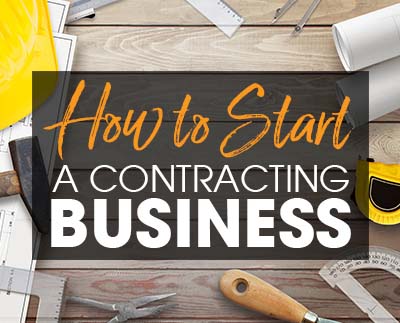
Starting your own contracting business is a huge step forward in your career. You’ve finally decided to take matters into your own hands, but you’re not quite sure where to start. Not to worry, we’re here to help.
The first thing to keep in mind is that starting a remodeling business not only requires contracting skills and experience, but also business and project management skills. You need to know how to run a business and how to follow up with projects in order to succeed.
This guide on how to start a contracting business will set you on the right path so you can devise a business plan and take all the necessary steps to run a successful remodeling business.
Devise a business plan

Even before you consider starting your own contracting company, you need to come up with a business plan. Think of it as a detailed overview of your future business; it should contain a list of all the services you’re going to offer, financial projections based on extensive market research, your rates based on a competitive analysis, budgets and profit margins, sales plan, target market, etc.
The secret to any successful business always starts with building a solid foundation, and that’s exactly what your business plan is. It’s the foundation on which your company will grow, so you need to make sure it’s strong enough to carry the weight, otherwise your business might crumble. Here’s an example of a basic business plan that you can modify for your specific needs.
Apply for licenses

In order to run a remodeling/contracting business, you’re going to have to obtain all the necessary licenses from your city or state. Without proper licensing or registration, you cannot legally complete contracting jobs. Certain states require licensing, while others simply require registration.
What’s the difference between the two? Licensing is a longer process that involves passing exams and proving that you are qualified in the trade. Registration, on the other hand, is simply having a written record of the work you will be performing. There is no assurance that your company is an expert or is competent enough to complete contracting work. Click here if you want to learn more about different state requirements.
Buy insurance

If you don’t want to end up being financially responsible for mistakes or accidents, you’re going to want to buy an excellent insurance policy. You need one that will provide general liability coverage for you and your employees, as well as insurance on your tools and your property.
There are different types of insurance policies to think about, including workman’s compensation insurance, sole proprietors’ insurance (if you’re working alone), and general liability insurance. Visit HomeAdvisor Pro for more information on insurance policies for remodelers and contractors.
Purchase equipment & software

Another thing to consider when you’re thinking about how to start a contracting business is whether or not you have all the tools you need to take on projects. This doesn’t just include building equipment, but also office equipment such as computers, billing & accounting software, project management tools, and design software.
If you’re planning on doing all the work yourself, you’re also going to want to invest in a truck or van so you can easily transport all your equipment to job sites. Always make sure you’re fully equipped for the jobs you take on, otherwise it will reflect poorly on your remodeling company.
Hire qualified staff

Unless you’re planning on running a one-person show, you need a team to help you out. Before you hire anyone, make sure you’ve done your fair share of research and have checked their credentials. You need employees you can rely on and who are qualified, otherwise you will be wasting time constantly checking their work and rectifying their mistakes.
Aside from hiring construction workers and builders, you might also want to look into hiring people to take care of the design work as well as the administrative work. If you spend too much time trying to juggle every aspect of your company, you will spend all your waking hours at work and eventually burn out.
Set up payment options

Payment is a tricky subject when it comes to home improvement companies. Oftentimes, you end up with outstanding invoices that your clients promise they will pay for in the near future. This is problematic because not only are you not getting paid on time, you also have to keep track of all outstanding invoices and send out reminders, which is a hassle.
If you’re planning on running a profitable contracting business, you’re going to have to set up payment options. You can ask your clients for a deposit at the start of the project, a percentage due halfway through, and the balance due on delivery. You can even look into setting up a payment plan for your clients through your bank. Whatever you choose, make sure your client signs a contract that binds them to your agreement.
Promote your business

It’s no secret that marketing plays a huge role in lead generation. One of the best ways to get the word out about your new contracting business is to promote it online. The first thing you want to do is create a beautiful website that lists all your services, your fees, your portfolio (if you have one), and your sales process. Make sure it’s clear and has all the information your prospects need to get in touch with you.
Now that you have a website, it’s time to market it. You can promote your website on social media (Facebook, Instagram), Houzz, and you can even look into paid advertising. If you want more information on how to promote your business, take a look at this post on marketing for contractors.
Share this Post




